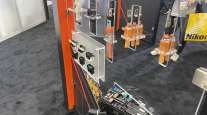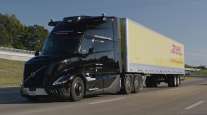Managing Editor, Features and Multimedia
Autonomous Trucks Show Progress at CES

[Stay on top of transportation news: Get TTNews in your inbox.]
LAS VEGAS — The pathway toward large-scale commercialization of self-driving trucks became clearer at CES 2024 as tech startups unveiled the latest upgrades to their autonomous driving systems and highlighted partnerships with industry suppliers at the giant technology show.
Aurora Innovation and Kodiak Robotics showcased the autonomous Class 8 truck designs that they plan to deploy in their first fully driverless commercial operations.
While self-driving prototypes have been hauling freight on certain highways for years with safety drivers still behind the wheel, both Kodiak and Aurora are preparing to take the next big step forward by introducing unmanned trucks later this year.
Kodiak founder and CEO Don Burnette said “2024 is the year of driverless.”
“It’s not some distant goal. It’s not some distant future,” he said. “It will be this year, which is really exciting.”

Aurora and Kodiak both are planning to roll out their first fully autonomous trucks on Interstate 45 between Dallas and Houston.
Those initial driverless operations will begin with small-scale deployments. Aurora has said that it plans to launch commercially with about 20 driverless trucks at the end of this year.
At the same time, autonomous truck developers have been laying the foundation for high-volume production and deployment of driverless trucks further in the future.

Who's Who in the Autonomous Space
►Overview of Self-Driving Truck Development
Company Sketches
Click the links to jump to profiles of autonomous companies.
Aurora | Waymo | TuSimple | Gatik | Locomation | Torc Robotics | Waabi | Einride | Plus | Embark | Kodiak Robotics | Robotic Research | Outrider | Pronto
Aurora has partnered with global automotive supplier Continental to enable mass production of its autonomous driving system starting in 2027.
Through this agreement, first announced in April, Continental will develop and supply automotive-grade hardware for the Aurora Driver, which will incorporate Continental products ranging from sensors and automated driving control units to high-performance computers and telematics units. In the days leading up to CES, the companies announced they had finalized the design of that hardware.
In addition to its work with Continental, Aurora also has been partnering with truck makers Paccar Inc. and Volvo Trucks to integrate its self-driving technology with their vehicles.
These partnerships, along with the involvement of motor carriers, shippers and industry regulators, are paving the way for commercialization at scale, said Sterling Anderson, Aurora’s co-founder and chief product officer.
“We’ve really been laying a lot of that groundwork,” he said.
Aurora showcased its latest autonomous driving technology installed on a Peterbilt tractor at Continental’s CES exhibit.
“It’s real, and it’s turning into a real commercial product,” Anderson said.

At CES 2024, Aurora highlighted its partnership with Continental, which will supply automotive-grade hardware for the Aurora Driver. (Seth Clevenger/Transport Topics)
Elsewhere at the show, Kodiak debuted its “driverless ready” sixth-generation self-driving truck, equipped with autonomous driving software and an upgraded suite of sensors along with redundant braking, steering and power systems to ensure safe operation without a human driver onboard.
“This is the design that will take us to driverless,” Burnette said.
New features on the sixth-generation truck include top-mounted, extra-bright hazard lights to alert other motorists if the truck pulls to the side of the road and microphones designed to detect the presence of emergency vehicles.
Unlike some of its competitors in the autonomous truck space, Kodiak has not announced formal development partnerships with truck manufacturers. Kodiak displayed its autonomous driving system installed on a Kenworth T680 model at CES, but the company said it plans to roll out its latest technology on multiple vehicle types.

Autonomous trucking company Gatik showcases one of its self-driving medium-duty box trucks at CES. (Seth Clevenger/Transport Topics)
Also during CES, autonomous trucking company Gatik announced a tire data partnership with Goodyear Tire & Rubber Co. to help advance the safety and performance of its self-driving medium-duty box trucks.
Gatik said it plans to implement Goodyear’s SightLine intelligent tire technology this year across a portion of its self-driving fleet in the United States and Canada.
This technology, built into Goodyear tires, connects with Gatik’s automated driving system to provide data on metrics such as temperature, tire pressure and road conditions, which is especially beneficial in the rain, ice and snow, said Richard Steiner, Gatik’s VP of government relations and public affairs.
Peter Vaughan Schmidt of Torc and Joanna Buttler of Daimler Truck discuss the timeline for autonomous trucks entering the market and how they could blend into existing fleet operations. Tune in above or by going to RoadSigns.ttnews.com.
“We’re not just in this to operate on perfect, dry roads in sunny conditions,” he said. “If you truly want to operate an autonomous transportation network across North America, you’ve got to be able to handle the inclement conditions as well. This partnership is really helping to address that.”
Gatik, which focuses on automating shorthaul routes, already began conducting fully driverless commercial deliveries for Walmart in Arkansas in 2021 and for Canadian grocer Loblaw Cos. in Ontario in 2022.
By the end of 2024, Gatik intends to deploy unmanned Class 6-7 box trucks “at meaningful scale” in the Texas market, Steiner said. “This is a really exciting year for autonomous trucking,” he added.
Another autonomous truck developer, Torc Robotics, announced a collaboration with sensor technology developer Aeva during CES.

Self-driving truck developer Plus highlights its PlusDrive driver-assist system at CES. (Seth Clevenger/Transport Topics)
Torc, an independent subsidiary of Daimler Truck, will incorporate Aeva’s Atlas 4D lidar technology into its self-driving trucks to detect objects faster, farther away and with higher accuracy as it prepares to commercially launch its autonomous driving system by 2027.
Also at CES, self-driving truck developer Plus, which is pursuing a more incremental path toward autonomous driving, showcased a tractor equipped with its PlusDrive product. This advanced driver assist system automates steering, braking and acceleration but still requires a human driver to actively oversee the technology.
Other technology companies developing autonomous driving systems for on-road commercial trucks in North America include Waabi, Stack AV, RRAI and Einride.
Want more news? Listen to today's daily briefing below or go here for more info:





